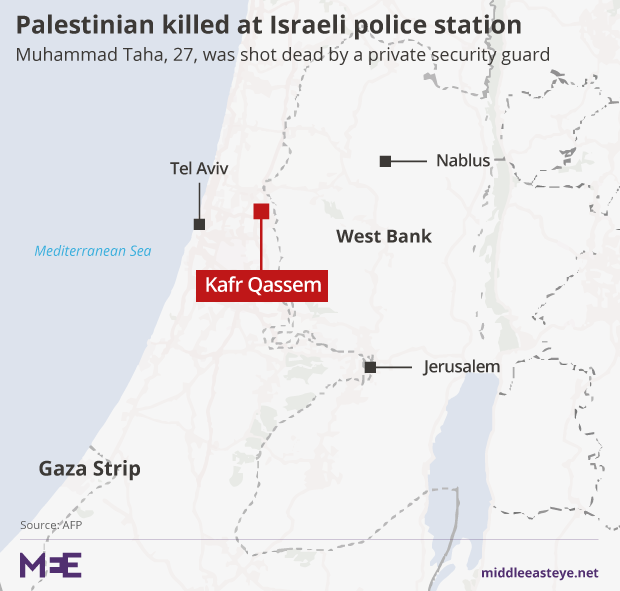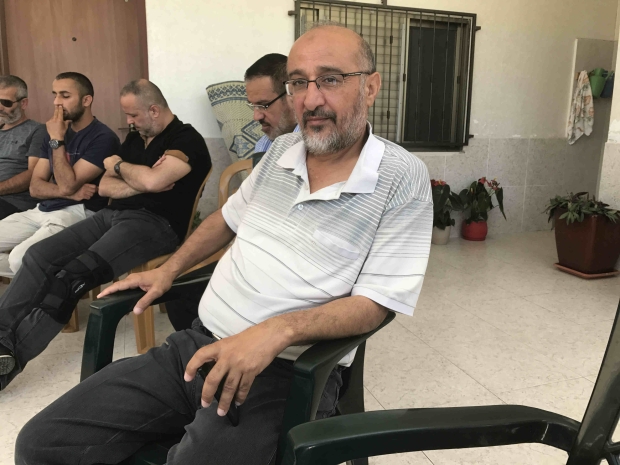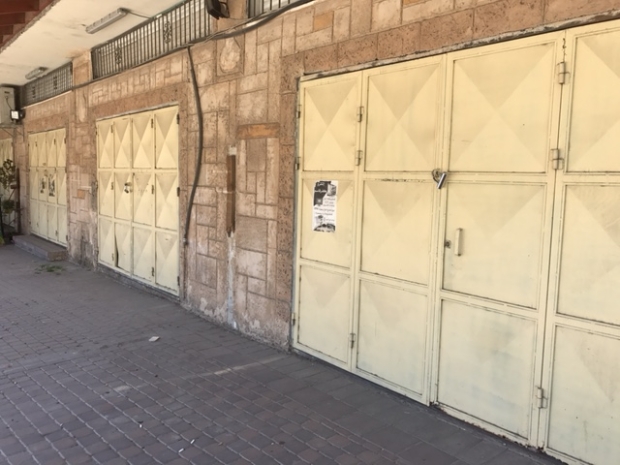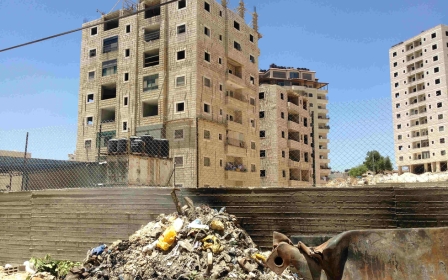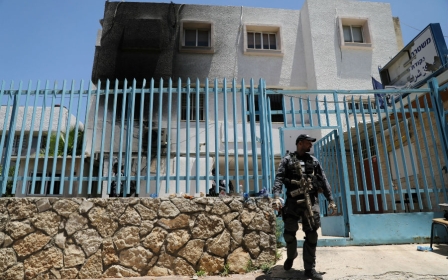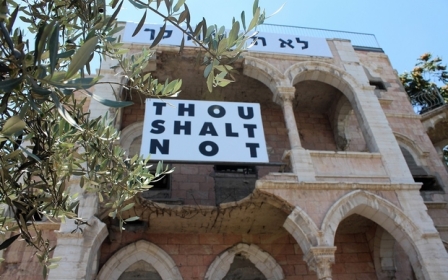'He was loved by all': Killing of Kfar Qassem youth is symbol of Israeli neglect, say locals
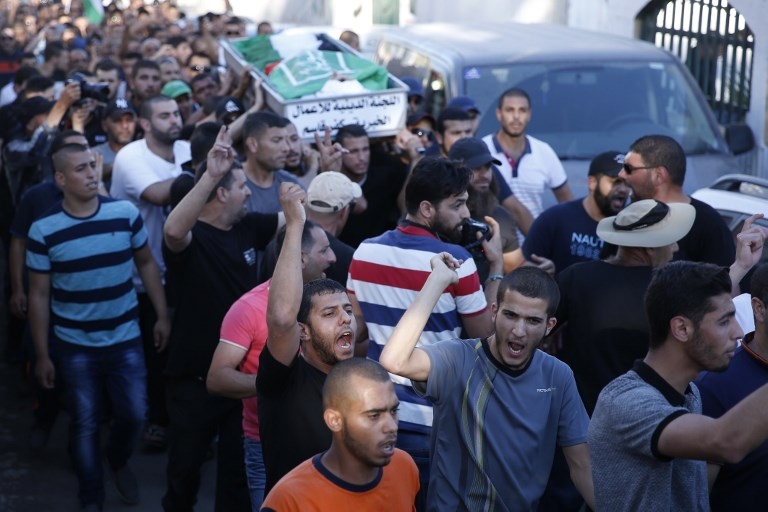
The killing of Muhammad Taha on Tuesday in Kafr Qassem, an Arab city inside Israel, is emblematic, locals say, of the state’s lack of respect for Palestinian lives.
Muhammad Taha, 27, was shot dead by a private security guard at an Israeli police station, and his death has added to growing feelings of anger and disillusionment in the city, which on Wednesday witnessed a general strike.
Stores across the city were shuttered, and in other Arab cities, as residents protested what is being called a killing in “cold blood”.
Taha was shot dead after angry residents assailed police who had detained and reportedly beaten a local resident during a traffic stop at the entrance to the village, witnesses have told Middle East Eye.
'His death comes from the same policy of violence and eviction: the government wants us to leave'
- Mahmoud Taha, father
Adel Badir, a lawyer and head of the village’s popular committee, told MEE that he saw the man being roughly detained, pepper-sprayed and then tasered by the police. Badir said that the attack was unprovoked.
“He was calm, and was even telling others who were agitated to calm down,” said Badir. “When they beat him he fell to the ground. Then the people became very angry, and started throwing stones, and then burned a police car.”
The crowd moved to the police station in the town and began to throw stones. A door to the police station was opened from the inside, and shots were fired at those outside, where Taha was standing.
Taha was taken to hospital in a serious condition, and died shortly after.
“He was a beautiful boy,” Taha’s father, Mahmoud, said at the family home. “He was loved by all.”
Pattern of police harassment
Badir said that the youth in the village were angry at what they saw as needless police harassment at a time when Kafr Qassem has seen six murders since the beginning of the year, none of which the police have properly tried to solve, locals feel.
“Then the youth went to the police station in the town,” continued Badir. “I tried to stop them and wanted to enter into the police station. But then someone inside the station opened the door and shot from inside, and Muhammad was hit.”
Israeli police spokesperson Micky Rosenfeld said the security guard had opened fire "as a result of a life-threatening situation”.
But to Badir, who witnessed the events unfold, the shooting appeared unnecessary, despite the violent nature of the protest.
“Why didn’t they shoot in the air, or at his legs? The door was opened by the guard inside. If he had kept it closed, nothing could have happened to him.”
For Taha, the incident has not only taken his son’s life, but is the continuation of something much larger.
It has evoked ugly memories for him, as his uncle was killed in the 1956 massacre in the city, when Israeli Border Police shot dead 49 residents as they returned from their fields.
“I consider my son to be the 50th victim,” he continued. “His death comes from the same policy of violence and eviction: the government wants us to leave.”
The city’s young people, he told MEE, see the incident as another example of institutionalised neglect: a police force that does not seem to care about protecting the Palestinian-Israeli community, but is trigger-happy when it comes to fighting them.
Institutionalised neglect
“Why do they have a police station in the town if they do not do their main job, and stop the violence?” he asked.
“If my son had been Jewish, this would never have happened. The police didn’t even show their guns to the settlers at Amona, despite the violence.”
'Through this incitement they deliver a message to the Israeli police that the Arab citizens are enemies and must be treated according to this logic'
- Jehad Abu Rayya, lawyer and political activist
Adel Badran, the town’s mayor, said that the incident was indicative of the lack of security that Israel’s Palestinian residents have had to grow accustomed to.
“We have had many murders here in the past five months, none of which have been solved by the police,” he told Middle East Eye.
“When there is any protest or any demonstration that involves Arabs in Israel, the police use live fire very quickly, but we have never heard about them using live fire with any other group in Israel, such as the Charedim in Jerusalem,” he said, referring to a branch of Orthodox Judaism.
Wahbi Amir, a local youth worker and activist, described what he saw as a lax police response when one of his close friends was murdered in the town. “The first police car didn’t arrive until 20 minutes after he had been killed, and they didn’t put a helicopter in the air until two hours after the event happened,” he said.
Badir, the lawyer, told MEE that he entered the police station after the shooting, and helped to defuse the situation. But he is intensely critical of the police’s actions in Kafr Qassem. “The only thing they really do is erect checkpoints at the village entrance and take traffic fines from people,” he said.
“Lately we have created a force of local guards in the town who patrol at night, especially around trouble spots and where there has been violence.”
He said that he saw the need for this local force as indicative of the Israeli authorities’ abdication of their responsibilities towards the Palestinian community, and called for Palestinians inside Israel to be given greater autonomy.
“If the Israeli state and its institutions are not able to give us security, then they should let us use our own institutions to provide it,” he told Middle East Eye.
Deep sense of mistrust
Other, more recent, events have also added to an already deep sense of mistrust between Israel’s Palestinians and the state.
In January, police shot and killed Yacoub al-Kaeean, a teacher from the Negev, during a raid on the village of Umm al-Hiran. At first, the Israeli authorities claimed he had deliberately attacked police, and accused him of being linked to the Islamic State group.
Evidence subsequently emerged, however, that al-Kaeean had not tried to attack police before being killed.
Wahbi, the social worker, said that the killing of Taha was a continuation of the policy that killed al-Kaeean. “What happened in Umm al-Hiran has happened here, and it will happen again, because no one has stopped this situation.”
“The Palestinians in Israel are at a junction in their relationship with Israel,” he continued. “The state is using more and more force and crossing more and more red lines.”
Speaking to MEE, Jehad Abu Rayya, a lawyer and political activist from Sakhnin, said that the Israeli government was to blame for such violence.
“The easy way the Israeli police kill Arab citizens inside Israel is because the Israeli government continues to incite its own citizens against Palestinians,” he said.
“Through this incitement they deliver a message to the Israeli police that the Arab citizens are enemies and must be treated according to this logic.”
Ayman Odeh, the head of the Joint Arab List party in Israel’s parliament, the Knesset, in a statement agreed, saying that “the police … continue to treat the Arab minority with the mentality that they are their enemies, and think that they should fight them rather than protect them. The people in Kafr Qassem cannot accept the abnormal reality that lets their blood be wasted.”
“I feel that the Israelis are continuing what they started in 1948. I think that they regret letting us stay, so they are putting so much pressure on us that we leave,” Taha’s father, Mahmoud, said. “It’s broken this family to lose Muhammad. He was like a flower.”
Middle East Eye propose une couverture et une analyse indépendantes et incomparables du Moyen-Orient, de l’Afrique du Nord et d’autres régions du monde. Pour en savoir plus sur la reprise de ce contenu et les frais qui s’appliquent, veuillez remplir ce formulaire [en anglais]. Pour en savoir plus sur MEE, cliquez ici [en anglais].


